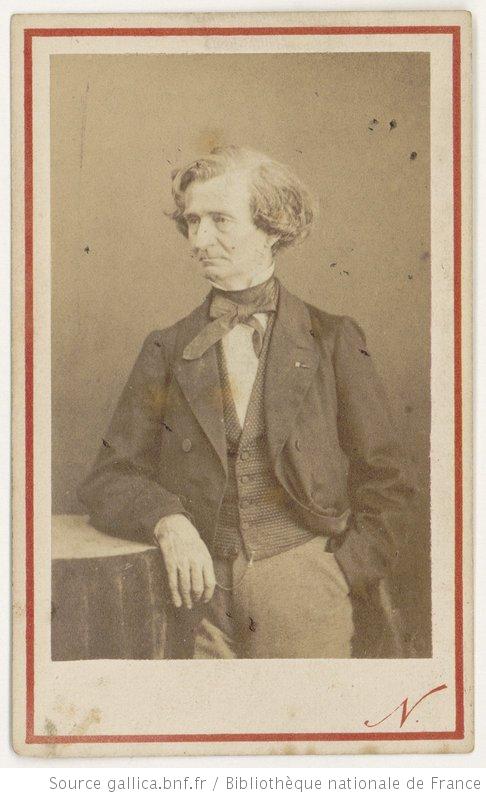- Profession: Composer.
- Residences: Grenoble, Paris.
- Relation to Mahler:
- Correspondence with Mahler:
- Born: 11-12-1803 Grenoble. France.
- Died: 08-03-1869 Paris, France.
- Buried: 11-03-1869 Montmartre cemetery, Paris, France.
Hector Berlioz was a French Romantic composer, best known for his compositions Symphonie fantastique and Grande messe des morts (Requiem). Berlioz made significant contributions to the modern orchestra with his Treatise on Orchestration. He specified huge orchestral forces for some of his works, and conducted several concerts with more than 1,000 musicians. He also composed around 50 songs. His influence was critical for the further development of Romanticism, especially in composers like Richard Wagner, Nikolai Rimsky-Korsakov, Franz Liszt, Richard Strauss, Gustav Mahler and many others.
In 1828 Berlioz heard Beethoven’s third and fifth symphonies performed at the Paris Conservatoire – an experience that he found overwhelming. He also read Johann Wolfgang von Goethe’s Faust for the first time (in French translation), which would become the inspiration for Huit scènes de Faust (his Opus 1), much later re-developed as La damnation de Faust.
He also came into contact with Beethoven’s string quartets and piano sonatas, and recognised the importance of these immediately. He began to study English so that he could read Shakespeare. Around the same time, he also started writing musical criticism. He began and finished composition of the Symphonie fantastique in 1830, a work which would bring Berlioz much fame and notoriety. He entered into a relationship with – and subsequently became engaged to – Marie Moke, despite the symphony being inspired by Berlioz’s obsession with Harriet Smithson. As his fourth cantata for submittal to the Prix de Rome neared completion, the July Revolution began. “I was finishing my cantata when the revolution broke out,” he recorded in his Mémoires.
“I dashed off the final pages of my orchestral score to the sound of stray bullets coming over the roofs and pattering on the wall outside my window. On the 29th I had finished, and was free to go out and roam about Paris till morning, pistol in hand.” He finally won the prize with the cantata Sardanapale. He also arranged the French national anthem La Marseillaise and composed an overture to Shakespeare’s The Tempest, which was the first of his pieces to play at the Paris Opéra. An hour before the performance, a sudden storm created the worst rain in Paris for 50 years, meaning the performance was almost deserted.
Berlioz met Franz Liszt who was also attending the concert. This proved to be the beginning of a long friendship. Liszt would later transcribe the entire Symphonie fantastique for piano to enable more people to hear it. On 8 March 1869, Berlioz died at his Paris home, No.4 rue de Calais, at 30 minutes past midday. He was surrounded by friends at the time. His funeral was held at the recently completed Église de la Trinité on 11 March, and he was buried in Montmartre Cemetery with his two wives, who were exhumed and re-buried next to him. His last words were reputed to be “Enfin, on va jouer ma musique” (“At last, they are going to play my music”).


